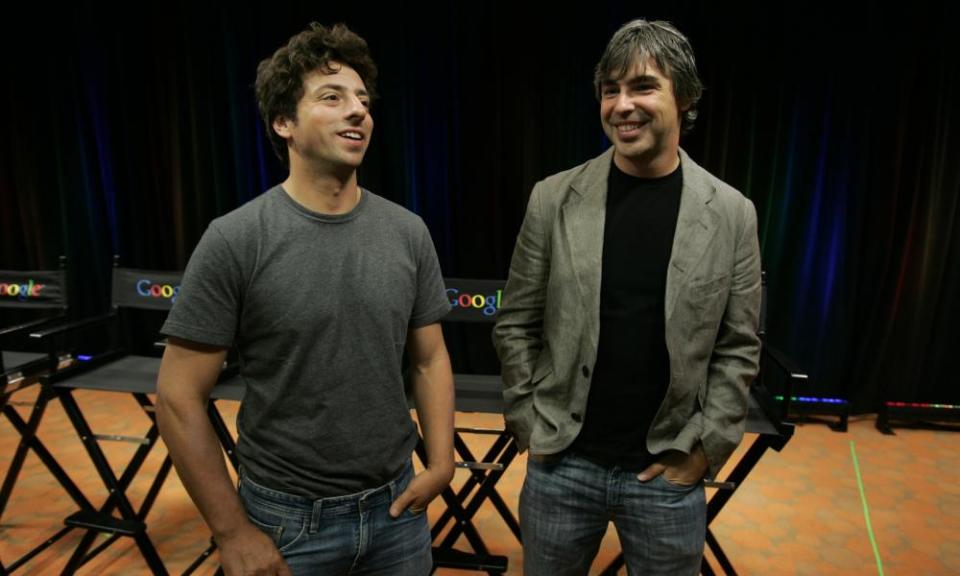Why has Alphabet hit the panic button? Only Google can answer that question

In a strange way, the best thing that could have happened to Google (now masquerading as Alphabet, its parent company) was Facebook. Why? Because although Google invented surveillance capitalism, arguably the most toxic business model since the opium trade, it was Facebook that got into the most trouble for its abuses of it. The result was that Google enjoyed an easier ride. Naturally, it had the odd bit of unpleasantness with the EU, with annoying fines and long drawn out legal wrangles. But it was the Facebook boss, Mark Zuckerberg – not Google’s Larry Page, Sergey Brin and their adult supervisor Eric Schmidt – who was awarded the title of evil emperor of the online world.
This sometimes enabled Google to fly below the regulatory radar and avoid public criticism. Its relative immunity may also have been fostered by credulity induced by its “Don’t be evil” motto. What may also have helped is the way that, over the years, it fumbled quite a few things – Google+, Google Wave, Google Glass, Knol and Google Reader, to name just five. On the other hand, it also managed to create useful and successful products – Gmail, for example, plus Google Maps, Google Scholar, Google Earth and Google Books. And, of course, it made inspired acquisitions of YouTube in 2006 and of artificial intelligence startup DeepMind in 2014.
What enabled the company to get away with that mixture of creativity, fumbling and indirection, obviously, was that it was always rolling in money. The mighty cash pump of its search engine and associated ad business has dependably provided revenues of $100bn-plus a year since 2017 for the enrichment of its shareholders. With that kind of income you can afford to make a lot of mistakes, especially when you own the search engine that has a near monopoly of the market in most parts of the non-communist world.
It’s not as though Google’s chief executive and his colleagues are going naked into battle
So how come that this lucrative behemoth is suddenly at panic stations? Sundar Pichai, its chief executive, has issued a “code red” alert, whatever that means. It seems to involve recalling the company’s two co-founders, who had happily been spending time with their vast fortunes, to help right the ship. It also involves sacking people on an industrial scale – 12,000 to date. The methods involved in the dismissals are not as brutal as those employed by Elon Musk at Twitter, but the scale is real enough. One executive reported that the first indication that something was up came when he couldn’t access his Google Nest Hub smart home control. “When I went to check my work email,” he wrote, “I was still in a waking state and couldn’t make sense of why I was getting so many emails asking if I was OK. Scrolling further down, there was a form email from PeopleOps indicating, as you may have surmised by now, that my employment at Google has been terminated.”
Why the panic? Three reasons, in ascending order of urgency. The first is that the tech industry knows there’s a downturn coming and that it massively overrecruited during 2021 and 2022. To date, the main companies have fired about 200,000 employees. Second, the US justice department and eight states have filed a lawsuit against Google alleging that it illegally monopolised the online ad market through, according to the Politico website, a “years-long practice of self-dealing, anticompetitive acquisitions and forcing businesses to use multiple products and services that it offers”.
But the real reason for panic seems to be the San Francisco-based OpenAI company’s prototype artificial intelligence chatbot ChatGPT, the free version of which is taking the world by storm. This is worrying enough for Google, given that people are already using it as a kind of search engine. But maybe what’s alarming Pichai and co is that OpenAI is testing the market for a “pro” version costing $42 a month and providing faster responses and other goodies. And that the company is heavily backed by Microsoft.
Given that Google (and therefore Alphabet) is critically dependent on the continuing prosperity of Google Search, anything that might undermine it will look like an existential threat. And we know that, in the tech industry, former Intel chief executive Andy Grove’s mantra – that “only the paranoid survive” – is conventional wisdom. But even so, it’s hard to see why Pichai and his colleagues are so worried. After all, it’s not as though they are going naked into battle. Google has its own version of a ChatGPT-like system – LaMDA (language model for dialogue applications) – which, famously, an engineer found so compelling that he started to believe it might be sentient (and was later fired for going public with his views).
Given all this, why isn’t Google launching LaMDA? Is it because the company feels that it isn’t yet ready for wide deployment? Maybe it’s still being vetted, as ChatGPT is, for its ability to generate toxic content? Or is it because, in the light of the latest antitrust suit, the company is worried about the regulators? Who knows? It’s almost enough to make one want to ask ChatGPT: “Why is Google not releasing a chatbot like you?”
What I’ve been reading
Blow by blow account
The UK Is Wasting a Lot of Wind Power is a long and sobering blogpost by Archy de Berker on the dysfunctional way the country’s energy market – and grid planning – works.
Desktop publishing
Last week, the Ars Technica website had an interesting essay by Jeremy Reimer called Revisiting Apple’s Ill-Fated Lisa Computer, 40 Years On, marking the 40th anniversary of the precursor to the Macintosh.
Edited highlight
The Culture Wars Look Different on Wikipedia is a very thoughtful Atlantic piece by Noam Cohen on how the online encyclopaedia’s editing works.

 Yahoo Movies
Yahoo Movies 